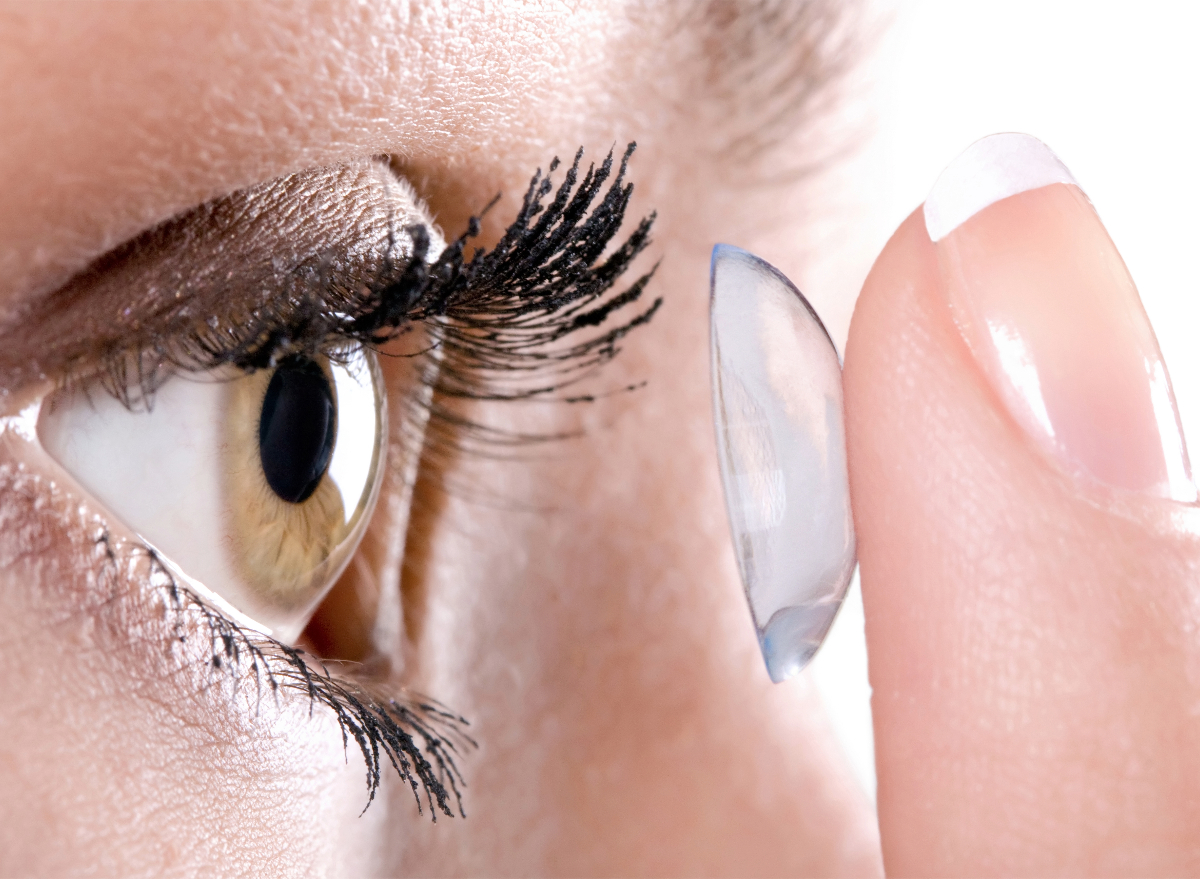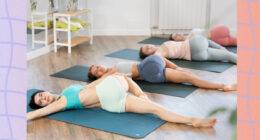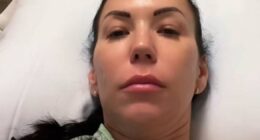We all know that taking care of our eyes is crucial, but sometimes, it’s easy to get lost in the blur of conflicting information online. According to the Centers for Disease Control and Prevention (CDC), 93 million U.S. adults are more susceptible to losing their vision, yet only 50% have been to their optometrist over the past year. We are here to clear up some common misconceptions about eye care so you can put healthy habits into practice and help preserve your precious vision. In fact, we learned nine things an eye doctor never does—and doesn’t want you to do, either.
This is your chance to gain invaluable insight and ensure the long-term health of your eyes. Julia Giyaur, MD, ophthalmologist and founding director at New York Laser Vision, tells Eat This, Not That!, “Taking steps to avoid these habits and practices can help maintain good eye health and reduce the risk of vision problems and eye diseases in the long run.”
So, join us as we explore the nine things an eye doctor never does—and you shouldn’t, either. And, when you’re finished, don’t miss 7 Foods a Neurosurgeon Never Eats—and Recommends You Avoid, Too.
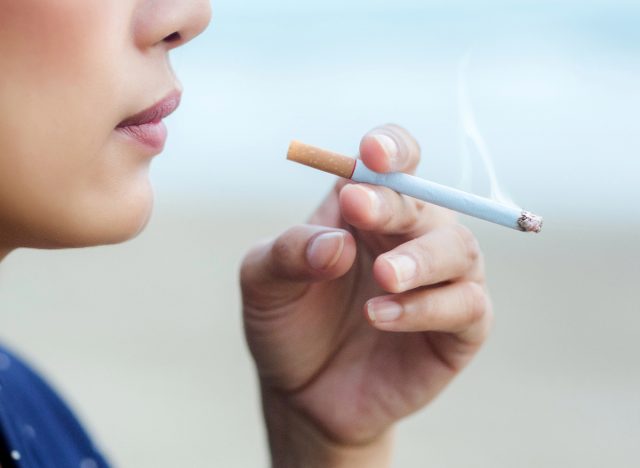

You may be surprised to hear that smoking increases your risk of developing eye conditions like cataracts, thyroid eye disease, and age-related macular degeneration. The harmful chemicals in tobacco smoke can damage the eye’s delicate tissues, leading to vision problems.
“Smoking is well known to cause damage to blood vessels,” says Giyaur. “It exacerbates the effects of hypertension and diabetes on the eye, leading to vision loss. It also puts the eye at risk for retinal blood vessel occlusion, or ‘stroke,’ in the eye.”
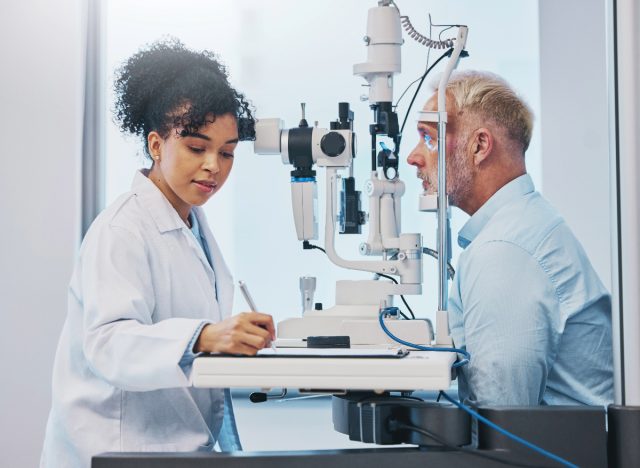

Regular eye exams are essential for maintaining good eye health, even if you don’t wear glasses or contact lenses. During these exams, doctors can pinpoint early signs of eye conditions. Ignoring them can mean missing out on early interventions that could prevent vision loss or other complications.
“Routine eye exams can detect early signs of eye conditions like glaucoma or diabetic retinopathy, which can progress silently until vision is irreversibly damaged. Prevention of these diseases is the key to keeping healthy vision and annual ophthalmology exams are essential for that. People with certain systemic conditions, such as diabetes, or with a family history of certain eye conditions, may need to see their doctor more frequently,” says Giyaur.


Keep your hands away from your eyes. Rubbing them can lead to eye irritation, redness, and even potential damage. Rubbing is a natural response to itchiness or discomfort, but it’s better to use a clean tissue or the palm of your hand to press on the area gently.
“Rubbing your eyes can lead to eye infections, irritation, and damage to the cornea,” cautions Giyuar. “It can also worsen conditions like dry eyes and lead to scratched corneas. Eye rubbing at a young age has been associated with a condition called keratoconus, in which cornea progressively thins and bulges out, causing severe vision loss.”


Prolonged exposure to UV rays is linked to cataracts, pterygium, and other eye conditions. That’s why wearing sunglasses that block out 100% of UVA and UVB rays is crucial, even on cloudy days.
Giyaur says, “Sunglasses with UV protection are essential to shield your eyes from harmful rays. Opt for sunglasses that offer 100 percent protection against UVA and UVB rays. These sunglasses are often labeled ‘UV400’ or ‘100% UV protection.'”
READ RELATED: Woman who miscarried fined by NHS for claiming free prescription while pregnant
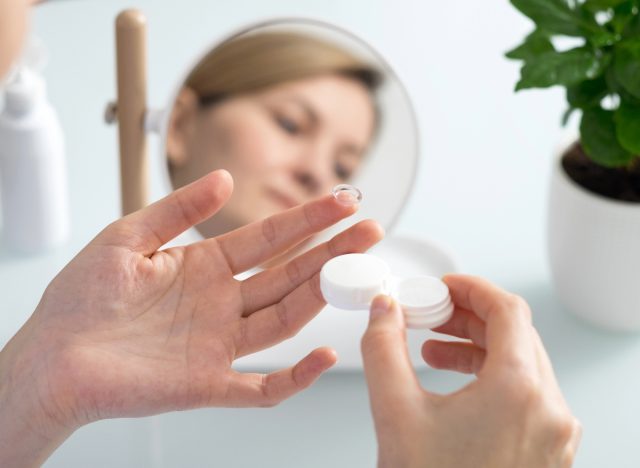

If you wear contact lenses, it’s vital to have healthy hygiene habits. Failing to do so can lead to eye infections, irritation, or more severe complications. Always wash your hands thoroughly before handling your contacts, and use the right solution for cleaning and storing them.
“Proper lens care involves thorough handwashing with soap and water before handling contact lenses. Use the recommended contact lens solution to clean, rinse, and disinfect your lenses daily. Store them in a clean and well-maintained lens case, replace the solution regularly, and follow the prescribed cleaning and replacement schedule provided by your eye care professional to ensure comfort, clarity, and eye health,” advises Giyaur.


According to the National Eye Institute, high blood sugar levels can lead to diabetic retinopathy. Also, elevated blood pressure levels can cause damage to your eye’s blood vessels. Managing these conditions through medication, lifestyle changes, and regular check-ups with your healthcare provider is essential for preserving your eye health.
Giyaur adds, “Autoimmune diseases like rheumatoid arthritis and thyroid disorders like Graves’ disease can impact eye health, causing issues like dry eyes, inflammation, and bulging. Neurological conditions like multiple sclerosis can result in optic neuritis and vision disturbances. Additionally, some medications and infections can also have ocular side effects.”


In today’s digital age, many of us spend long hours in front of screens. According to Cedars Sinai, digital eye strain can lead to discomfort, blurred vision, and headaches.
“To avoid digital eye strain, it’s essential to take regular breaks and follow the 20-20-20 rule, where you take a 20-second break every 20 minutes of screen time or close-up work and look at an object at least 20 feet away to reduce eye strain and discomfort. It helps refresh your eyes and prevent digital eye strain,” says Giyaur.


Research shows that nutrients like vitamins A, C, and E, as well as antioxidants, can help protect your eyes from damage. It’s essential to incorporate a variety of colorful fruits and vegetables into your meals to ensure you’re getting these essential nutrients.
Giyaur says, “Incorporating leafy greens, colorful fruits and vegetables, nuts, seeds, and fatty fish into your diet can help maintain good vision and reduce the risk of eye conditions like cataracts and age-related macular degeneration. Staying hydrated by drinking plenty of water also supports overall eye health.”


A lack of sleep can lead to eye strain, dry eyes, and other discomforts.
“Adequate sleep is crucial for maintaining optimal eye health,” says Giyaur. “During sleep, your eyes get a chance to rest and repair, reducing the risk of eye strain and discomfort. Insufficient sleep can lead to dry eyes, redness, and blurred vision, making it important to get seven to eight hours of quality sleep each night.”

